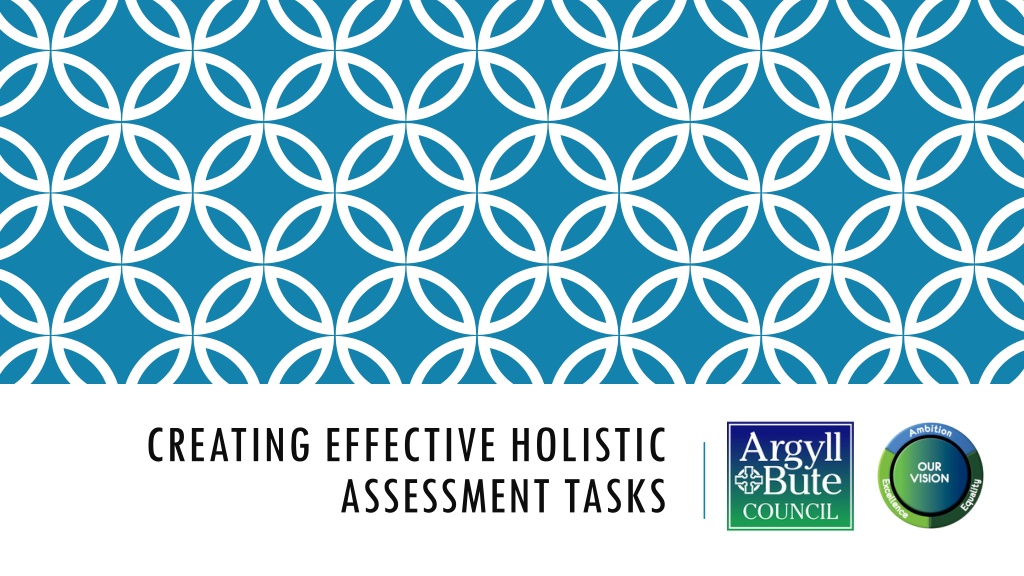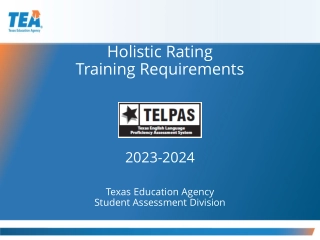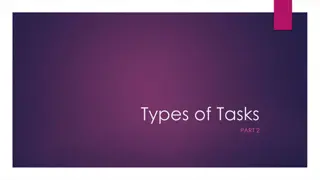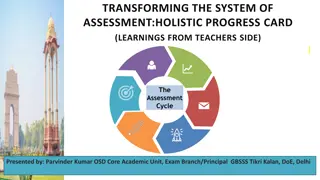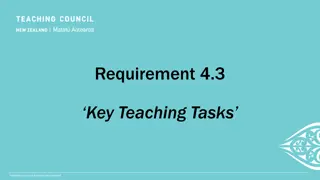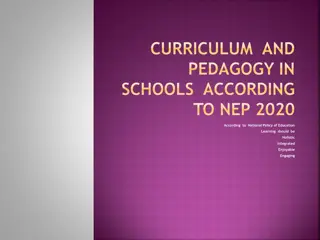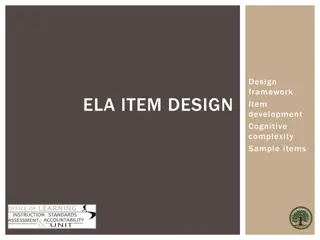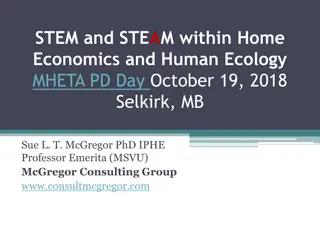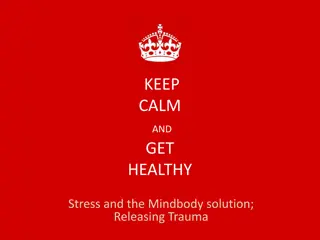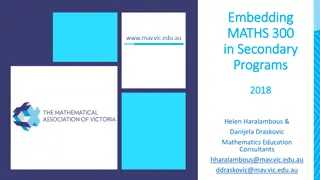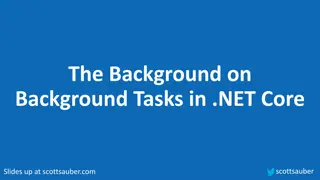Understanding Holistic Assessment Tasks in Education
Holistic assessment tasks in education aim to assess students' learning across various areas of development, incorporating higher-order thinking skills and application in real-world contexts. These tasks are used for pre-assessment, ongoing learning, and making professional judgments of achievement levels. They provide a fuller range of evidence, promote student engagement and independence, and help identify next steps clearly. The tasks encompass a breadth of learning from different contexts and emphasize the application of knowledge in new situations.
Uploaded on Nov 25, 2024 | 1 Views
Download Presentation

Please find below an Image/Link to download the presentation.
The content on the website is provided AS IS for your information and personal use only. It may not be sold, licensed, or shared on other websites without obtaining consent from the author. Download presentation by click this link. If you encounter any issues during the download, it is possible that the publisher has removed the file from their server.
E N D
Presentation Transcript
CREATING EFFECTIVE HOLISTIC ASSESSMENT TASKS
WHAT IS YOUR UNDERSTANDING OF HOLISTIC ASSESSMENT TASK ?
HOLISTIC ASSESSMENT TASKS Demonstrate breadth of learning they come from a range of Es and Os across different organisers Demonstrate challenge they ask pupils to use a range of higher order thinking skills such as analysis, creation, evaluation, problem solving, tackling multi step tasks, interpreting tasks Demonstrate application of learning in new and unfamiliar situations Come from one of the four contexts of learning: Life and ethos of the school as a community Curriculum areas and subjects Interdisciplinary learning Opportunities for personal achievement
WHEN AND HOW SHOULD WE USE HOLISTIC ASSESSMENTS? As pre-assessment to ascertain levels of understanding and/or competency As part of on-going learning and teaching approaches To assess application of knowledge and skills in new and unfamiliar contexts As part of the evidence base for making a professional judgement of achievement of a CfE level.
WHY DO WE USE HOLISTIC ASSESSMENTS? Demonstrate genuine understanding of learning Promotes whole school focuses on literacy and numeracy Promotes pupil engagement Gives pupils more independence as learners Enables clearer identification of next steps Fuller range of evidence INCREASE ATTAINMENT
WHAT KIND OF THINGS MIGHT A HOLISTIC ASSESSMENT CONTAIN? Tasks which draw on learning from earlier in the year Tasks which bring in elements of learning from more than one organiser Multi-stage task Tasks which require higher order thinking skills Tasks without too much explicit instruction
NUMERACY EXAMPLE ST COLUMBAS In June, P7/6 will be going to Iona for a day trip to learn about St Columba. There will be 23 children going and 3 adults. We must travel from Oban to Mull by ferry and then when we arrive on Mull, we must travel by bus from Craignure to Fionnphort before getting the ferry from Fionnphort to Iona. We must also have time to explore the Iona Abbey before returning to Oban. You must plan our day. This should include when you get up, what time you need to leave your own house and you must ensure that we leave on the ferry from Oban no earlier that 8am and that we are back in Oban by 6pm. You must also calculate the average cost per person.
DEMONSTRATES BREADTH MNU 2-10a MNU 2-10c MNU 2-09a MNU 2-02a MNU 2-03a.
DEMONSTRATES CHALLENGE Careful reading of the question to extract the relevant information Problem solving Multi-step question with evaluation Drawing on a range of learning possibly from throughout the year
DEMONSTRATES APPLICATION Relevant context a trip that is happening Elements of the question will have been covered previously but this format/combination will be new and unfamiliar. Application of key number skills but without explicit instruction
EXAMPLES OF HOLISTIC ASSESSMENTS LITERACY End of 1stLevel Create a game for the Christmas Fayre and write a clear set of instructions to help others play the game. Design a poster to persuade visitors to the fayre that your game is worth playing! Try each other s games by reading the instructions provided and choose your favourite, giving a reason for your choice.
THIS IS HOLISTIC BECAUSE Breadth comes from a range of organisers (writing and reading) Challenge requires learners to create, persuade and evaluate Application using the skills that they have learned in a new context
GROUP TASK 1: CREATE HOLISTIC ASSESSMENTS Select a bundle of Es and Os which reflect the learning happening in the classroom. Create 2 holistic assessments which require: oThe learner to draw on a range of learning oAppropriate level of challenge oHigher order thinking skills oApplication of learning in a new and unfamiliar situation oCome from one of the four contexts of learning
GROUP TASK 2: EVALUATION OF HOLISTIC ASSESSMENTS Now look at the task created by another group. Using the evaluative comment checklist, moderate the effectiveness of this task as a holistic assessment.
